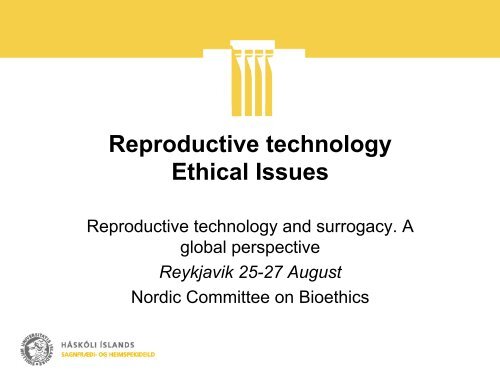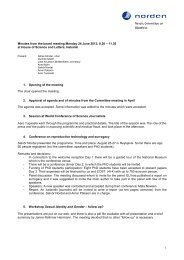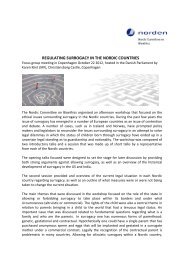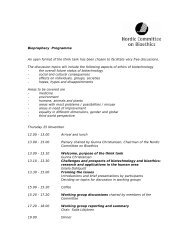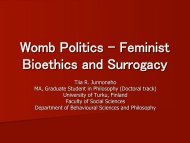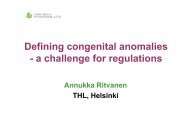Ethical issues of reproductive technology
Ethical issues of reproductive technology
Ethical issues of reproductive technology
Create successful ePaper yourself
Turn your PDF publications into a flip-book with our unique Google optimized e-Paper software.
Reproductive <strong>technology</strong><br />
<strong>Ethical</strong> Issues<br />
Reproductive <strong>technology</strong> and surrogacy. A<br />
global perspective<br />
Reykjavik 25-27 August<br />
Nordic Committee on Bioethics
Hunger for children<br />
• “When we speak <strong>of</strong> suffering <strong>of</strong> people who<br />
want to have children but cannot, “suffering” is<br />
neither metaphor nor hyperbole: people who<br />
crave children to raise and love but cannot<br />
have them suffer because, for many <strong>of</strong> us, our<br />
children are a vital part <strong>of</strong> our own flourishing”<br />
– Thomas H Murray, p. 14
Surrogacy<br />
• Adoptions are <strong>of</strong>ten complicated<br />
• People have rights to make contract and personal<br />
arrangements<br />
• Not much difference between surrogacy or ART and<br />
what takes place in other context<br />
• Willingness to give one <strong>of</strong> the greatest gift <strong>of</strong> all
Surrogacy<br />
• Treats children as commodities.<br />
• Treats women’s <strong>reproductive</strong> capacities or labor as<br />
commodities<br />
– analogy to slavery or prostitution<br />
• It is morally wrong <strong>of</strong> a woman to decide to have a<br />
child she does not want<br />
• Disputes about parental rights and responsibility
Complex <strong>issues</strong> and interests<br />
• The parents<br />
• The children<br />
• Egg and sperm donors<br />
• Surrogate mothers<br />
• Families <strong>of</strong> surrogate mothers<br />
• The understanding <strong>of</strong> “families”<br />
• Health care workers<br />
• Societies
The right to have children<br />
• Negative rights<br />
– Right against coercive interference in decisions<br />
regarding procreation<br />
– Forced sterilization or abortions<br />
• Positive right<br />
– Entitlement or assistance in procreation<br />
– Artificial Reproductive <strong>technology</strong>, surrogacy
Procreative Autonomy<br />
• The right <strong>of</strong> procreative autonomy has an important<br />
place […] in Western Political thought. The most<br />
important feature <strong>of</strong> that culture is a belief in<br />
individual human dignity: that people have the moral<br />
right – and the moral responsibility – to confront the<br />
most fundamental questions about the meaning and<br />
value <strong>of</strong> their own lives for themselves: answering to<br />
their own conscience and convictions. The principle<br />
<strong>of</strong> procreative autonomy, in a broad sense, is<br />
embedded in any genuinely democratic culture”<br />
» Ronald Dworkin: Life’s Dominion
Or not?<br />
• “Reproduction indeed matters to people; it is indeed<br />
a part <strong>of</strong> life in which they express their deepest<br />
belifes. But it does not follow that it is or should be<br />
seen primarily as a matter <strong>of</strong> self-expression, or that<br />
it should be protected as we protect self-expression.<br />
Reproduction is unlike both contraception and<br />
abortion, it that it aims to bring a third party – a child<br />
– into existance […] <strong>reproductive</strong> decisions are<br />
irresponsible unless those who make them can<br />
reasonabley <strong>of</strong>fer adequate and lasting care and<br />
support to the hoped-for child”<br />
• Onora O’Neill, Autonomy and trust in Bioethics
Intimate family relations<br />
• We need a rich description <strong>of</strong> the moral life <strong>of</strong><br />
parents and children, one that captures the<br />
complexity <strong>of</strong> motives for having and raising<br />
children ant the significance <strong>of</strong> children in the<br />
lives <strong>of</strong> adults – on <strong>of</strong> the two central meaning<br />
<strong>of</strong> the “worth” <strong>of</strong> a child.<br />
• Thomas H. Murray
The right to an open future<br />
• Parents have responsibility to help their<br />
children during their growth to adulthood to<br />
develop capacities for practical judgment and<br />
autonomous choice, and to develop as well at<br />
least a reasonable range <strong>of</strong> the skills and<br />
capacities necessary to provide them the<br />
choice <strong>of</strong> a reasonable array <strong>of</strong> different life<br />
plans available to members <strong>of</strong> their society<br />
– Joel Feinberg
The right <strong>of</strong> children<br />
• Right to be loved and cared for<br />
– Welfare in up-bringing<br />
• Right to know about biological parents<br />
– Adopted children seek their origin<br />
• Autonomy rights require information<br />
– Genetic information<br />
• A right to have two parents, or father and<br />
mother?
Motherhood<br />
• Gestational mother<br />
– Full surrogacy: the birth mother is genetically unrelated to<br />
child. Emotional ties during pregnancy<br />
• Genetic mother<br />
– The biological mother<br />
• The one who will bring up the child<br />
• Who has the weightiest moral claim?
Different understanding <strong>of</strong> family<br />
• Our understanding <strong>of</strong> family is rapidly changing.<br />
• Moving from the biological concept to legal<br />
understanding and then to subjective intention.
Broad understanding<br />
• “Family members are individuals who by birth,<br />
adoption, marriage, or declared commitment<br />
share deep personal connections and are<br />
mutually entitled to receive and obligate to<br />
provide support <strong>of</strong> various kinds to the extent<br />
possible, especially in times <strong>of</strong> need”<br />
• From Carol Levine
The parent-child relationship<br />
• The child as property – egoistic model<br />
– Biology is the base <strong>of</strong> ownership<br />
• The parent as steward – altruistic model<br />
– parents as serving or as caretakers – do not act out<br />
<strong>of</strong> self-interest but the interest <strong>of</strong> the child<br />
• Mutualism in the parent-child relationship<br />
– takes the interest <strong>of</strong> both children and parents into<br />
account. Flourishing <strong>of</strong> parents and children are<br />
intertwined. Relationship is given greater weight
Mutualism<br />
• Mutualism rejects this either-or. There are<br />
circumstances—the parent-child relationship<br />
being the leading example—in which you<br />
cannot honestly describe what motivates the<br />
actore—here, the parents—as strictly egoistic<br />
or altruistic. It is some inextricable blend <strong>of</strong><br />
concern for other and concern for self”<br />
• Thomas H. Murray
What if?<br />
• When these things go wrong they go badly<br />
wrong.<br />
– The surrogate mother wants to keep the child?<br />
– The surrogate mother wants to keep contact with the<br />
child?<br />
– The child does not meet expectations <strong>of</strong> the<br />
parents?<br />
• Obligations and responsibility
Salvör Nordal<br />
Centre for Ethics, University <strong>of</strong> Iceland<br />
salvorn@hi.is


